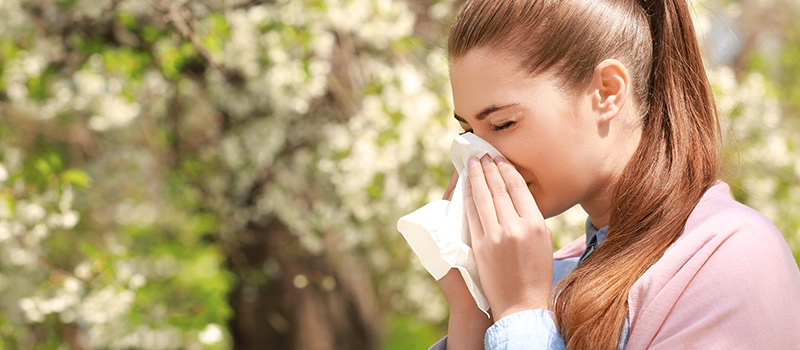What is the Best Treatment for Allergic Asthma?

When asthma symptoms are triggered by an allergic reaction, this is classified as “allergic asthma”. This allergy-induced asthma is usually associated with common causes such as pollen, dust, mold, or pet dander. As a result, allergic asthma sensitivities are more difficult to avoid and manage effectively. Therefore, treatment is required for both the allergic and the asthmatic symptoms. With it being one the most common types of asthma in the United States, what is the best treatment for allergic asthma?
What Is the Difference Between Allergy and Asthma?
The immune system of a person with allergic asthma will respond to allergens in the same way a person with traditional asthma would; trying to expel harmful bacterial or viruses by coughing. This bodily response can flare up existing asthma symptoms. As a result, people looking for the best treatment for allergic asthma should limit time they spend outside during high dust and pollen seasons. Limiting contact with allergens through controlled indoor humidity will prevent mold and filtering your air at home along with keeping your living environment clean are the best treatments for allergic asthma. There are also various prescriptions or over-the-counter allergy and asthma medications that can reduce symptoms over time.
Allergic Asthma Causes and Common Symptoms
A person with a family history of either allergies or asthma is more likely to develop allergic asthma. When a person with allergic asthma encounters allergens, their airway begins to swell, and they start having trouble breathing.
These allergens include:
Pollen
Pet dander
Dust mites and cockroaches
Tobacco smoke
Air pollution
Strong odors or chemical fumes
People with common food allergies like dairy, seafood, wheat, or nuts may also be induced to an asthmatic reaction. These allergic asthma symptoms include:
Wheezing and coughing
Chest tightness
Rapid breathing
Shortness of breath
Allergic reactions such as skin problems or congestion can occur depending on the level of contact with the allergens and your own sensitivity. These symptoms can range from mild to severe and make it harder to perform exercises or even laugh without coughing. When these symptoms occur, it becomes more difficult to breath as your airways become smaller and can therefore lead to an asthma attack. If you are looking for the best treatment for allergic asthma, we have some solutions for you.
What Are the Reliable Treatments for Allergic Asthma?
The best treatment for allergic asthma requires elements that manage the underlying asthma condition as well as the allergy symptoms. Long term relief can come in the form of inhaled corticosteroids such as Flovent or Symbicort inhalers which can reduce the frequency of symptoms over time. Your doctor may also prescribe an emergency or rescue inhaler which contains fast-acting medication to prevent or treat an asthma attack. Over-the-counter allergy treatments such as decongestants or antihistamines like Zyrtec, Allegra, or Claritin function by reducing your sensitivity to allergens. There are also prescription treatments such as Singulair which can treat both the allergy and the asthma at once.
You can also consider going through immunotherapy by receiving regular allergy shots from your doctor which helps to build an immunity to certain allergies. If nothing else works, there is also anti-immunoglobulin E therapy which targets the chemical signals that cause allergies for those with severe and persistent asthma. Taking preventative steps to avoid potential allergy triggers has become the best treatment for allergic asthma. The goal is to reduce the chances of allergen exposure.
Here are some tips to avoid asthma-inducing allergic reactions:
Staying away from cats or dogs if you are allergic to pet dander
Limiting your time outdoors during allergy season to reduce encountering pollen
Using hypoallergenic sheets and mattresses as well as washing them regularly to keep dust mites away while you sleep
Cleaning with a HEPA filter vacuum to reduce the amount of dust on surfaces
Dusting with a damp clothe to minimize dust in the air
Maintain a clean and dry home to prevent any mold from growing
Precautions
Talk with your doctor and review your medical history along with current medications before starting an allergic asthma treatment. An allergy specialist will be able to determine if your asthma symptoms are triggered by preexisting allergies and determine an appropriate treatment. Skin tests for signs of allergies and respiratory tests for lung function assessment will be conducted in order to come up with a proper diagnosis. During treatment, your symptoms may change requiring adjustment by your doctor. While there is no absolute cure, using any best treatment for allergic asthma symptoms will help to improve your quality of life.
Besides allergies, there are other potential asthma triggers, including respiratory infection, overexertion, or cold air. You should be aware of all possible asthma causes when deciding on the best treatment for allergic asthma.
For more information on the best treatment for allergic asthma, visit your healthcare provider to find out what asthma treatment is recommended for you. You can find detailed information about our asthma medications on our website.
Allergens and Allergic Asthma – Asthma and Allergy Foundation of America – https://www.aafa.org/allergic-asthma/
IMPORTANT NOTE: The above information is intended to increase awareness of health information and does not suggest treatment or diagnosis. This information is not a substitute for individual medical attention and should not be construed to indicate that use of the drug is safe, appropriate, or effective for you. See your health care professional for medical advice and treatment.


